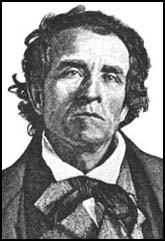Theodore Dwight Weld
|
|
Theodore Dwight Weld (1803–1895), the author of American Slavery As It Is: Testimony of a Thousand Witnesses, was an American abolitionist. He was born in Hampton, Connecticut, where he lived until 1825 when his family moved to upstate New York. He entered Hamilton College, where he became the disciple of Charles Finney, a famous evangelist.
While a student at Lane Theological Seminary in Cincinnati, Weld became a leader of the "Lane Rebels." This group of students held a series of slavery debates over 18 days in 1834 that divided the community. When the school's board of directors, including president Lyman Beecher, tried to prohibit the students from supporting abolitionism, Weld and a group of students left the seminary and were accepted by Oberlin College.
He married Angelina Emily Grimke in 1838. From 1836 to 1840, Weld worked as the editor of the Emancipator. In 1839, he co-wrote with Angelina and her sister, abolitionist Sarah Moore Grimké American Slavery As It Is: Testimony of a Thousand Witnesses, on which Harriet Beecher Stowe partly based Uncle Tom's Cabin. Weld used pen names for all of his writings, which many scholars believe to be the reason that he is not as well known as other abolitionists such as William Lloyd Garrison or Arthur Tappan.
External sources
- Columbia 2003 Encyclopedia Article (http://www.bartleby.com/65/we/Weld-The.html)
- Letters of Theodore Dwight Weld, Angelina Grimke and Sarah Grimke, 1822-1844: Vols. 1 & 2, ISBN 0-8446-1055-0
- Robert H. Abzug, Passionate Liberator: Theodore Dwight Weld & the Dilemma of Reform (New York: Oxford University Press, 1980) ISBN 0195030613
- Robert K. Nelson, "'The forgetfulness of sex': Devotion and Desire in the Courtship Letters of Angelina Grimké and Theodore Dwight Weld," Journal of Social History 37 (Spring 2004): 663-679. (http://muse.jhu.edu/journals/journal_of_social_history/v037/37.3nelson.html)

